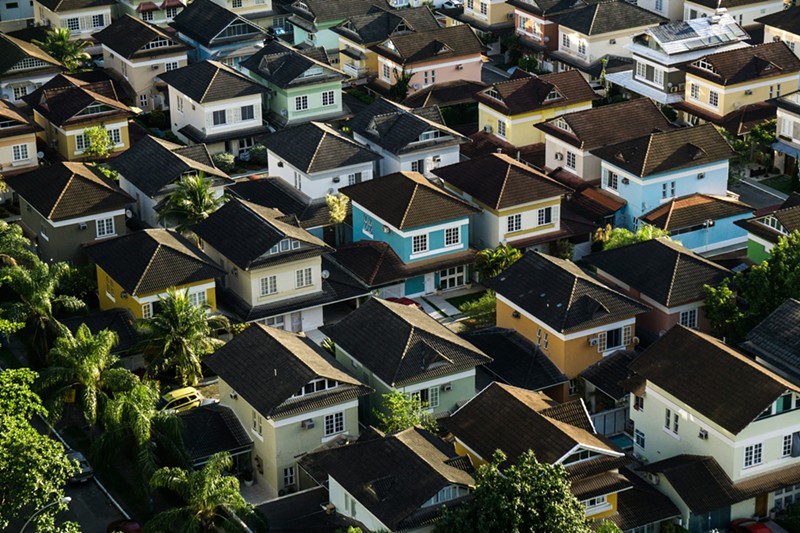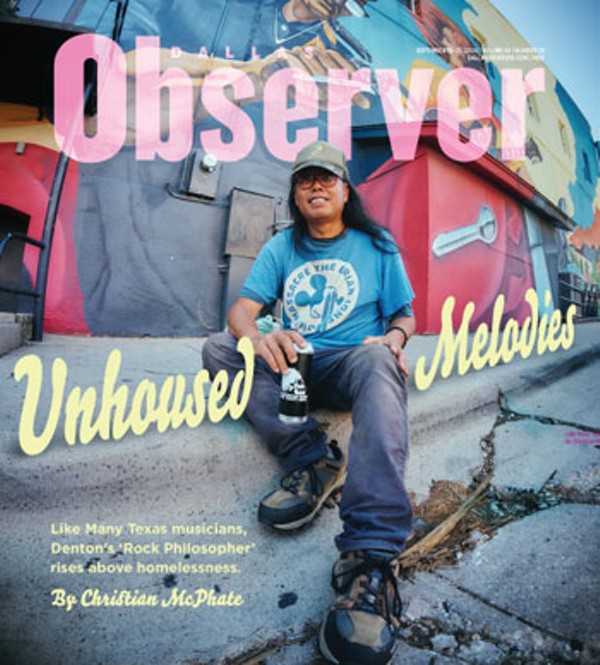After months of controversy, revisions, amendments and city meetings, Dallas City Council is finally slated to take on the ForwardDallas plan in today’s meeting. The document, which would guide the uses of private and public lands, is the city’s first attempt at tackling a comprehensive land-use plan since 2006.
It’s been met with a wave of opposition rivaled by few other city initiatives. A common refrain from the disbelievers is that the document marks the end of single-family neighborhoods as we know them. Some worry that the proposed increase in density will result in a wave of crime like the one Dallas spent the last three years tempering. And others believe that the document doesn’t go far enough, hampered by the outspoken voices of “Not In My Backyard” activists.
The first draft of the plan was released in fall 2023, and earlier this month, council member Paul Ridley proposed several “compromise amendments” to the document. Ridley told Candy’s Dirt that he believes the amendments will help assuage concerns that the policy document will destabilize single-family neighborhoods.
City Council is sure to hear from all sides during today’s public comment, be it from the believers, the skeptics or the adversaries. If you don’t have it in you to sit through hours of back and forth debate, or if you want to get warmed up for the show, here’s your sneak preview on what Dallasites think about ForwardDallas 2.0.
The Believer: Caleb Roberts
His Credentials: Roberts is the executive director of Downwinders at Risk, an activist group dedicated to environmental justice initiatives. He has a masters in urban planning from the University of Texas at Austin and uses his education to work in the intersections of housing, environment and zoning.
His Thoughts on ForwardDallas: Environmental justice is listed as a pillar of the ForwardDallas 2.0 plan, and the document specifically addresses residential areas where industrial zoning is nearby.
These communities are typically “in or near communities of color,” the document states, something Roberts has been trying to flag for years through campaigns against the GAF shingle factory in West Dallas, Shingle Mountain in Floral Farms and air pollution in Joppa. He believes ForwardDallas 2.0 offers a chance to help neighborhoods that are “at risk immediately.”
While ForwardDallas is not a zoning document, it will serve as a reference for future zoning cases. By identifying areas that have historically been subjected to “incompatible land uses” like those Roberts advocates for, the document will help “prioritize and inform potential future rezonings” in those areas.
“I think a lot of people are nervous about what this means for their communities. From our perspective though, we're nervous what happens if we don't make this change,” Roberts told the Observer. “People think all single-family neighborhoods are against this, and I want to show what single-family communities are benefiting from this. … ForwardDallas is effecting positive change on these communities. Why is that not a part of the single-family discussion?”
“I think a lot of people are nervous about what this means for their communities. From our perspective though, we're nervous what happens if we don't make this change." — Caleb Roberts, Downwinders at Risk
tweet this
There has been criticism over the way ForwardDallas was handled by city staff (Ridley himself said the process “could have been improved”) and Roberts believes the year-long back-and-forth on the document has resulted in gaps in information within the collective perception of the document.
He also thinks that while the City Council should vote to pass the document, it’s doing “a lot of heavy lifting for the city” despite being a guidance plan.
“I do think it is a little bit of a privilege to say what about the future, when we're dealing with things that are happening today. And that's not to knock anyone for being fearful,” Roberts said. “I think, unfortunately, ForwardDallas is a place where people are making all of their concerns about the city happen at one time, and I just don't think a plan of this nature is strong enough to address all those concerns. … I think it should pass because there's a lot of work to be done and without the tools, we can't do anything.”
The Skeptic: Abraham Moreno
His Credentials: Moreno is a Dallas ISD senior who plans to study urban planning in college next year. He is a dedicated advocate for safe street design, as documented by D Magazine last year, and serves as the District 1 appointee to the Dallas Youth Commission.
His Thoughts on ForwardDallas: On a conceptual level, Moreno believes that the decision to bring ForwardDallas into the modern era was a good one. But hours of City Plan Commission meetings, a wave of amendments and the push-and-pull of NIMBY’s and YIMBY’s (Yes In My Backyard) have resulted in a “watered down” final product, Moreno told the Observer.
While the majority of opposition to ForwardDallas has insisted it doesn’t do enough to preserve single-family neighborhoods, Moreno is arguing in the opposite direction, believing the document should do more to enshrine diverse and dense housing types citywide.
“We talk about engagement, engagement, engagement. For people to get engaged, we have to make these meetings available to everyone.” — Abraham Moreno, Dallas ISD student
tweet this
“I've been calling it BackwardDallas instead of ForwardDallas, because it just feels like we're bringing Dallas back to what it was,” Moreno said. “The poor areas like Oak Cliff get gentrified, while the whiter, richer areas of Dallas just keep their single-family housing.”
Duplexes, triplexes, fourplexes, mixed use: you name it, Moreno wants it.
And he wishes that all of it was in the version of ForwardDallas that the City Council will see today. He is skeptical that the document will ultimately have a significant impact after witnessing what he describes as a document “meant to outline a better future for all generations” having been whittled down by “What I wants" from existing homeowners.
The document’s effect on DART, however, could be a silver lining, Moreno added. The plan outlines increased density in areas surrounding DART transit stations, something Moreno believes could help boost ridership which could, in turn, improve the city’s financial relationship with the agency.
For a process that has perhaps been burdened with the amount of community feedback it has received, Moreno wishes there had been more opportunities to contribute his ideas to the plan.
“A lot of the meetings that council and even the City Plan Commission had, they're in the middle of the school day. And with me graduating and all that stuff, I can't go because school matters way too much now,” Moreno said. “We talk about engagement, engagement, engagement. For people to get engaged, we have to make these meetings available to everyone.”
Even, it seems, the kids.
The Adversary: Douglas Newby
His Credentials: Newby is a Realtor and savant of all home-related issues in Dallas. His self-published blog has hundreds of entries on everything from preservation and short-term rentals, to urban growth and ForwardDallas.
His Thoughts on ForwardDallas: Newby has been a resident of Old East Dallas since the early '70s, time that has afforded him the chance to witness the “worst neighborhood” in Dallas become one of the most well-regarded.
When he moved in, Newby says, the neighborhood was made up of duplex, triplex and quadplex apartments that encouraged overly dense living situations, transience and crime. Zoning that made single-family homes a requisite and built out the neighborhood’s Historic Districts are what, in his mind, saved the area.
Now, Newby believes the city is going back to a 50-year-old zoning plan that will harm his beloved neighborhood, and he believes they’ve been sneaky about doing so.
“They have stated that they have had hundreds of meetings with homeowners associations and community groups and listened to what the community wants,” Newby told the Observer. “Every single homeowners association group that they have talked to, the homeowners have said ‘We do not want apartments added to our neighborhood.’”
But even with Ridley’s amendments, which he says clarify the difference between land use placetypes and zoning, many homeowners still believe that as soon as the document is passed, they’ll be living next door to an apartment complex. In Newby’s case, there is concern that ForwardDallas will have a negative effect on single-family neighborhoods and the affordable housing market.
Over his career he has observed the developer market, and worries that ForwardDallas’ flexible allowances for diverse housing types will result in developers snapping up the cheapest lots on every city block and flipping the homes. Because of the high costs of construction right now, the rent on those units ends up being unaffordable to most, he says.
“Every time they add a duplex or triplex or fourplex, they are eliminating an affordable home,” Newby said. “Apartments cost more per square foot to build than single family homes cost per square foot to build, and the existing housing stock and older housing stock is the greatest opportunity for affordable housing. That's what they want to eliminate to get more density.”
Newby does believe that Dallas needs to prioritize building apartments, but that placing apartments in the neighborhoods that are “the greatest assets in Dallas” is the city shooting itself in the foot. At a time when people choosing to leave Dallas County are outpacing those who choose to live here, Newby believes ForwardDallas will keep the city on a track going in the wrong direction.
“Cities are getting hollowed out where they have rich people in high rises, they have low-income people and the middle-income people move out,” Newby said. “Why wouldn't you want to give confidence to homeowners and invest in the city rather than undermine their confidence in a neighborhood? Every time they build an apartment in a neighborhood, that's going to disappoint homeowners and make them less likely to stay.”













